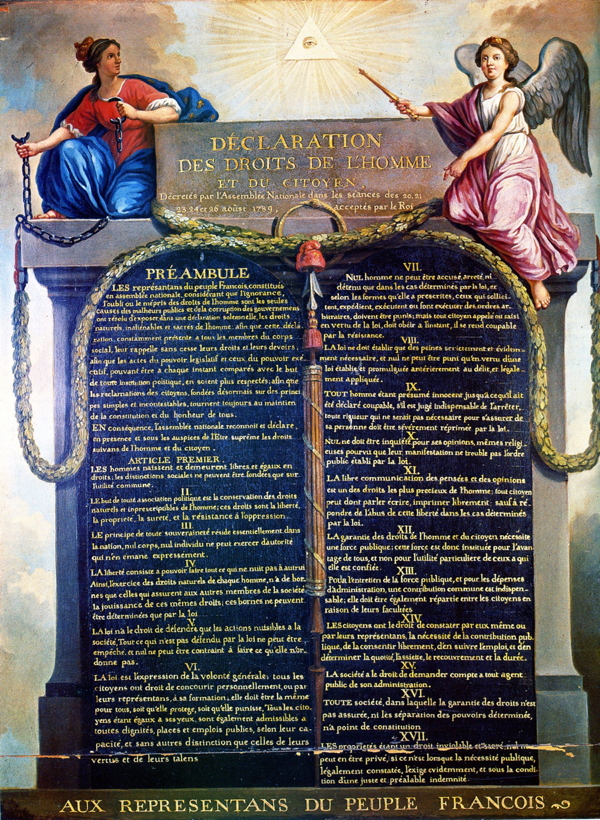Sunday - July 15, 2012
Déclaration des Droits de l'Homme et du Citoyen de 1789
Déclaration des Droits de l'Homme et du Citoyen de 1789

A Phrygian Cap - symbol of the freed slave.

[See large version 4268 px [PDF 2.1 MB]]
See also The Declaration of the Rights of Man and of Citizens: A Contribution to Modern Constitutional History by Georg Jellinek, Dr. Phil. et Jur. , Professor of Law in the University of Heidelberg. Authorized translation from the German by Max Farrand, Ph.D.. Revised by the Author (New York: Henry Holt and Company, 1901). Chapter V. Comparison with American Bills of Rights, where he compares, section by section, the French Declaration of the Rights of Man and the Citizen with similar sections from American state Bills of Rights, in order to show how the latter influenced the former. On the OLL.
Source of thé French version: <http://www.conseil-constitutionnel.fr/conseil-constitutionnel/francais/la-constitution/la-constitution-du-4-octobre-1958/declaration-des-droits-de-l-homme-et-du-citoyen-de-1789.5076.html>
Les Représentants du Peuple Français, constitués en Assemblée Nationale, considérant que l'ignorance, l'oubli ou le mépris des droits de l'Homme sont les seules causes des malheurs publics et de la corruption des Gouvernements, ont résolu d'exposer, dans une Déclaration solennelle, les droits naturels, inaliénables et sacrés de l'Homme, afin que cette Déclaration, constamment présente à tous les Membres du corps social, leur rappelle sans cesse leurs droits et leurs devoirs ; afin que les actes du pouvoir législatif, et ceux du pouvoir exécutif, pouvant être à chaque instant comparés avec le but de toute institution politique, en soient plus respectés; afin que les réclamations des citoyens, fondées désormais sur des principes simples et incontestables, tournent toujours au maintien de la Constitution et au bonheur de tous.
En conséquence, l'Assemblée Nationale reconnaît et déclare, en présence et sous les auspices de l'Etre suprême, les droits suivants de l'Homme et du Citoyen.
Art. 1er. Les hommes naissent et demeurent libres et égaux en droits. Les distinctions sociales ne peuvent être fondées que sur l'utilité commune.
Art. 2. Le but de toute association politique est la conservation des droits naturels et imprescriptibles de l'Homme. Ces droits sont la liberté, la propriété, la sûreté, et la résistance à l'oppression.
Art. 3. Le principe de toute Souveraineté réside essentiellement dans la Nation. Nul corps, nul individu ne peut exercer d'autorité qui n'en émane expressément.
Art. 4. La liberté consiste à pouvoir faire tout ce qui ne nuit pas à autrui : ainsi, l'exercice des droits naturels de chaque homme n'a de bornes que celles qui assurent aux autres Membres de la Société la jouissance de ces mêmes droits. Ces bornes ne peuvent être déterminées que par la Loi.
Art. 5. La Loi n'a le droit de défendre que les actions nuisibles à la Société. Tout ce qui n'est pas défendu par la Loi ne peut être empêché, et nul ne peut être contraint à faire ce qu'elle n'ordonne pas.
Art. 6. La Loi est l'expression de la volonté générale. Tous les Citoyens ont droit de concourir personnellement, ou par leurs Représentants, à sa formation. Elle doit être la même pour tous, soit qu'elle protège, soit qu'elle punisse. Tous les Citoyens étant égaux à ses yeux sont également admissibles à toutes dignités, places et emplois publics, selon leur capacité, et sans autre distinction que celle de leurs vertus et de leurs talents.
Art. 7. Nul homme ne peut être accusé, arrêté ni détenu que dans les cas déterminés par la Loi, et selon les formes qu'elle a prescrites. Ceux qui sollicitent, expédient, exécutent ou font exécuter des ordres arbitraires, doivent être punis ; mais tout citoyen appelé ou saisi en vertu de la Loi doit obéir à l'instant : il se rend coupable par la résistance.
Art. 8. La Loi ne doit établir que des peines strictement et évidemment nécessaires, et nul ne peut être puni qu'en vertu d'une Loi établie et promulguée antérieurement au délit, et légalement appliquée.
Art. 9. Tout homme étant présumé innocent jusqu'à ce qu'il ait été déclaré coupable, s'il est jugé indispensable de l'arrêter, toute rigueur qui ne serait pas nécessaire pour s'assurer de sa personne doit être sévèrement réprimée par la loi.
Art. 10. Nul ne doit être inquiété pour ses opinions, même religieuses, pourvu que leur manifestation ne trouble pas l'ordre public établi par la Loi.
Art. 11. La libre communication des pensées et des opinions est un des droits les plus précieux de l'Homme : tout Citoyen peut donc parler, écrire, imprimer librement, sauf à répondre de l'abus de cette liberté dans les cas déterminés par la Loi.
Art. 12. La garantie des droits de l'Homme et du Citoyen nécessite une force publique : cette force est donc instituée pour l'avantage de tous, et non pour l'utilité particulière de ceux auxquels elle est confiée.
Art. 13. Pour l'entretien de la force publique, et pour les dépenses d'administration, une contribution commune est indispensable : elle doit être également répartie entre tous les citoyens, en raison de leurs facultés.
Art. 14. Tous les Citoyens ont le droit de constater, par eux-mêmes ou par leurs représentants, la nécessité de la contribution publique, de la consentir librement, d'en suivre l'emploi, et d'en déterminer la quotité, l'assiette, le recouvrement et la durée.
Art. 15. La Société a le droit de demander compte à tout Agent public de son administration.
Art. 16. Toute Société dans laquelle la garantie des Droits n'est pas assurée, ni la séparation des Pouvoirs déterminée, n'a point de Constitution.
Art. 17. La propriété étant un droit inviolable et sacré, nul ne peut en être privé, si ce n'est lorsque la nécessité publique, légalement constatée, l'exige évidemment, et sous la condition d'une juste et préalable indemnité.
An English translation
[English translation <http://en.wikisource.org/wiki/Declaration_of_the_Rights_of_Man_and_of_the_Citizen>]
The representatives of the French people, constituted into a National Assembly, considering that ignorance, forgetting or contempt of the rights of man are the sole causes of public misfortunes and of the corruption of governments, are resolved to expose [i.e., expound], in a solemn declaration, the natural, inalienable and sacred rights of man, so that that declaration, constantly present to all members of the social body, points out to them without cease their rights and their duties; so that the acts of the legislative power and those of the executive power, being at every instant able to be compared with the goal of any political institution, are very respectful of it; so that the complaints of the citizens, founded from now on simple and incontestible principles, turn always to the maintenance of the Constitution and to the happiness of all.
In consequence, the National Assembly recognizes and declares, in the presence and under the auspices of the Supreme Being, the following rights of man and of the citizen:
Article I - Men are born and remain free and equal in rights. Social distinctions can be founded only on the common utility.
Article II - The goal of any political association is the conservation of the natural and imprescriptible [i.e., inviolable] rights of man. These rights are liberty, property, safety and resistance against oppression.
Article III - The principle of any sovereignty resides essentially in the Nation. No body, no individual can exert authority which does not emanate expressly from it.
Article IV - Liberty consists of doing anything which does not harm others: thus, the exercise of the natural rights of each man has only those borders which assure other members of the society the enjoyment of these same rights. These borders can be determined only by the law.
Article V - The law has the right to ward [i.e., forbid] only actions [which are] harmful to the society. Any thing which is not warded [i.e., forbidden] by the law cannot be impeded, and no one can be constrained to do what it [i.e., the law] does not order.
Article VI - The law is the expression of the general will. All the citizens have the right of contributing personally or through their representatives to its formation. It must be the same for all, either that it protects, or that it punishes. All the citizens, being equal in its eyes, are equally admissible to all public dignities, places and employments, according to their capacity and without distinction other than that of their virtues and of their talents.
Article VII - No man can be accused, arrested nor detained but in the cases determined by the law, and according to the forms which it has prescribed. Those who solicit, dispatch, carry out or cause to be carried out arbitrary orders, must be punished; but any citizen called [i.e., summoned] or seized under the terms of the law must obey at the moment; he renders himself culpable by resistance.
Article VIII - The law should establish only strictly and evidently necessary penalties, and no one can be punished but under a law established and promulgated before the offense and [which is] legally applied.
Article IX - Any man being presumed innocent until he is declared culpable, if it is judged indispensible to arrest him, any rigor [i.e., action] which would not be necessary for the securing of his person must be severely reprimanded by the law.
Article X - No one may be questioned about his opinions, [and the] same [for] religious [opinions], provided that their manifestation does not trouble the public order established by the law.
Article XI - The free communication of thoughts and of opinions is one of the most precious rights of man: any citizen thus may speak, write, print freely, save [if it is necessary] to respond to the abuse of this liberty, in the cases determined by the law.
Article XII - The guarantee of the rights of man and of the citizen necessitates a public force [i.e., a police force]: this force is thus instituted for the advantage of all and not for the particular utility of those to whom it is confided.
Article XIII - For the maintenance of the public force and for the expenditures of administration, a common contribution is indispensable; it must be equally distributed between all the citizens, by reason of their faculties [i.e., ability to pay].
Article XIV - Each citizen has the right of noting, by himself or through his representatives, the necessity of the public contribution, of free consent, of following the employment [of the contributions], and of determining the quotient [i.e., the share], the assessment, the recovering [i.e., the collecting] and the duration.
Article XV - The society has the right of requesting [an] account[ing] from any public agent of its [i.e., the society's] administration.
Article XVI - Any society in which the guarantee of rights is not assured, nor the separation of powers determined, has not a bit of Constitution.
Article XVII - Property being an inviolable and sacred right, no one can be deprived of private usage, if it is not when the public necessity, legally noted, evidently requires it, and under the condition of a just and prior indemnity [i.e., compensation].
.
